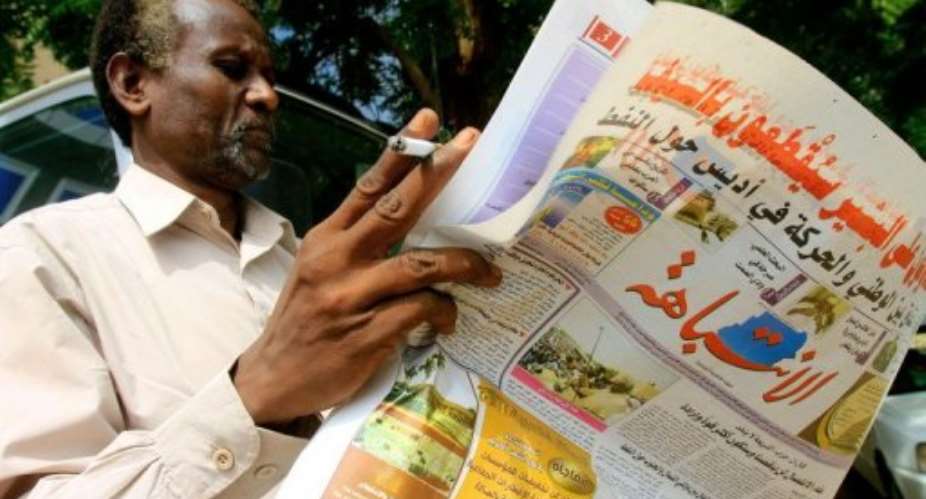KHARTOUM (AFP) - Sudan is trying to stifle critical reporting, media watchdog Reporters Without Borders said on Tuesday after authorities seized copies of the independent daily newspaper Al-Wan.
It is the 24th case of its kind recorded by the Paris-based watchdog this year.
"This new case of censorship... is symptomatic of a country where the authorities are trying to gag bothersome press coverage," the watchdog said on its website.
"Over the same period, around 20 journalists were questioned by authorities, or became victims of threats and official pressure."
Hussein Khogli, editor in chief of Al-Wan, confirmed to AFP that a state security agent on Sunday night visited the printer and banned distribution of Monday's edition after it had already come off the presses.
At midday Monday the security service called to say the papers could finally be distributed, which Khogli called "unacceptable".
"We suffered heavy financial losses from what happened today," he said.
"I don't know why they stopped our newspaper from distributing."
RSF says most articles targeted by censors are critical of the government's foreign or security policies.
Confiscating newspapers after they roll off the presses is a common tactic of Sudan's security service, causing financial losses in an industry already struggling for revenue. Some Sudanese newspapers have gone out of business this year.
Journalists and press freedom advocates say a media crackdown has intensified since last year. They have complained that journalists are also banned from writing and some newspapers ordered not to appear.
Al-Wan was suspended earlier this year but had resumed publishing.
Vice President Al-Haj Adam Youssef told reporters in August that freedom of expression had greatly improved over the past two decades but, as in any country, the government cannot allow the media to serve the interests of those who would destroy the state.
Sudan ranks 170 out of 179 countries on an index of press freedom compiled by RSF.
The watchdog also said journalist and activist Somaia Ibrahim Ismail "Hundosa" was "kidnapped and tortured for three days by security service officers who criticised her opposition to the regime of (President) Omar al-Bashir."
RSF said the incident happened late last month when the Sudanese woman, who lives in Egypt, returned home to visit family.
Another watchdog, the New York-based Committee to Protect Journalists, called on authorities "to immediately and credibly investigate this horrifying attack".
Sudan's National Intelligence and Security Service says it has no policy of torturing and beating people.





 Togo leader Gnassingbe follows father's political playbook
Togo leader Gnassingbe follows father's political playbook
 NDC panics over Bawumia’s visit to Pope Francis
NDC panics over Bawumia’s visit to Pope Francis
 EC blasts Mahama over “false” claims on recruitment of Returning Officers
EC blasts Mahama over “false” claims on recruitment of Returning Officers
 Lands Minister gives ultimatum to Future Global Resources to revamp Prestea/Bogo...
Lands Minister gives ultimatum to Future Global Resources to revamp Prestea/Bogo...
 Wa Naa appeals to Akufo-Addo to audit state lands in Wa
Wa Naa appeals to Akufo-Addo to audit state lands in Wa
 Prof Opoku-Agyemang misunderstood Bawumia’s ‘driver mate’ analogy – Miracles Abo...
Prof Opoku-Agyemang misunderstood Bawumia’s ‘driver mate’ analogy – Miracles Abo...
 EU confident Ghana will not sign Anti-LGBTQI Bill
EU confident Ghana will not sign Anti-LGBTQI Bill
 Suspend implementation of Planting for Food and Jobs for 2024 - Stakeholders
Suspend implementation of Planting for Food and Jobs for 2024 - Stakeholders
 Tema West Municipal Assembly gets Ghana's First Female Aircraft Marshaller as ne...
Tema West Municipal Assembly gets Ghana's First Female Aircraft Marshaller as ne...
 Dumsor is affecting us double, release timetable – Disability Federation to ECG
Dumsor is affecting us double, release timetable – Disability Federation to ECG
